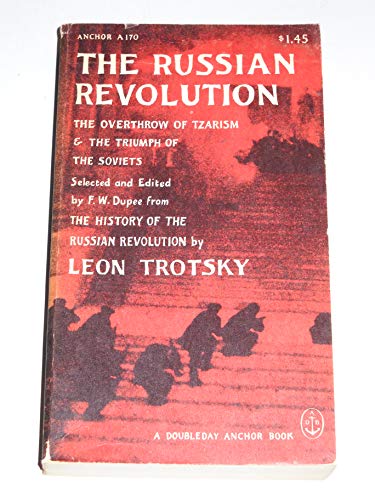Trotsky Leon Eastman Max Dupee (1 results)
FeedbackSearch filters
Product Type
- All Product Types
- Books (1)
- Magazines & Periodicals (No further results match this refinement)
- Comics (No further results match this refinement)
- Sheet Music (No further results match this refinement)
- Art, Prints & Posters (No further results match this refinement)
- Photographs (No further results match this refinement)
- Maps (No further results match this refinement)
- Manuscripts & Paper Collectibles (No further results match this refinement)
Condition
- All Conditions
- New (No further results match this refinement)
- Used (1)
Binding
- All Bindings
- Hardcover (No further results match this refinement)
- Softcover (1)
Collectible Attributes
- First Edition (1)
- Signed (No further results match this refinement)
- Dust Jacket (No further results match this refinement)
- Seller-Supplied Images (No further results match this refinement)
- Not Print on Demand (1)
Language (1)
Price
- Any Price
- Under £ 20
- £ 20 to £ 35 (No further results match this refinement)
- Over £ 35 (No further results match this refinement)
Free Shipping
- Free Shipping to United Kingdom (No further results match this refinement)
Seller Location
Seller Rating
-
The Russian Revolution; The Overthrow of Tzarism and The Triumph of the Soviets
Published by Doubleday (An Anchor Book), New York, N.Y., 1959
ISBN 10: 0385093985 ISBN 13: 9780385093989
Language: English
Seller: Ground Zero Books, Ltd., Silver Spring, MD, U.S.A.
First Edition
£ 19.20
Convert currency£ 22.37 shipping from U.S.A. to United KingdomQuantity: 1 available
Add to basketTrade Paperback. Condition: Good. First Anchor Books Edition. xiv, [2], 524 pages. Includes Editor's Note and Preface. Volume One covers The Overthrow of Tzarism; Volume Two covers The Attempted Counter-Revolution; Volume Three covers The Triumph of the Soviets. Also contains Conclusion, Chronological Table, A Short List of Principal Persons; A Short List of Principal Places; A Brief Glossary of Unfamiliar Terms; A List of Parties and Political Groups; and an Index. Selected and Edited by F. W. Dupee from The History of the Russian Revolution by Leon Trotsky, Translated from the Russian by Max Eastman. History of the Russian Revolution is a work by Leon Trotsky on the Russian Revolution of 1917. The first portion is dedicated to the political history of February Revolution and the second to that of October Revolution, with the intention of explaining the relations between these two events. The book was initially published in Germany in 1930. The original language is Russian, but it was translated into English by Max Eastman in 1932. The book was considered anti-stalinist in the Soviet Union, and only made it to publication in Russia as late as in 1997. Written during the early years of his enforced exile from Soviet Russia, Trotsky's History of the Russian Revolution quickly established itself as one of the great books of the twentieth century. It is the work of an individual who was himself a major participant in the experience he describes and who, in addition, was equally the man of letters and the man of action. Trotsky's historical theses are challenging; his judgments of other leaders intransigent. We are all the more free to accept, reject, or modify his ideas because he presents them with such proud and lucid candor. Beneath them lies the author's radical humanism and his vision of the events of 1917 in Russia as a decisive stage in the liberating of man's consciousness.


